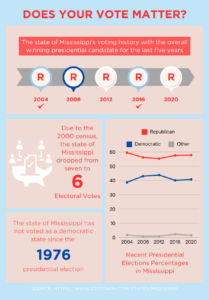
Students at the University of Mississippi are grappling with their role in democracy. Some students are skeptical about the value of their vote, while others believe in the importance of civic engagement.
Kennadi Parker, a sophomore allied health studies major from Olive Branch, Miss., shared her disinterest in voting in this year’s elections.
“At the end of the day, I don’t think my vote is important,” Parker said. “The electoral college process makes it feel pointless.”
KJ Johnson, a freshman business and entrepreneurship major from Grenada, Miss., said he is not voting in the upcoming election because he feels uninformed.
“I don’t really know anything about politics. So my vote would just be based on what everybody else is saying and not what I know,” Johnson said. “I feel like my vote could really mess them up, and the wrong person could win just off of that one vote.”
Johnson also said he feels unimpacted by the political system.
“I don’t really care about politics,” Johnson said. “I don’t really know what they do towards me.”
Gabre’el McKinney, an 18-year-old freshman theater arts major, will be voting for the first time this election cycle.
“I plan to vote because without everyone’s vote, it won’t help change the powers that are going to be taking place,” McKinney said. “(The year) 2024 can be a year of change, and we can all do it if we partake in this one thing.”
Julia Harless, a junior Arabic and biology major, shared similar sentiments.
“If one person believes that their vote doesn’t matter, then that encourages everyone else to think the same and that will have an effect in determining the election,” Harless said. “A teacher once told me how one town in California could not get their vote in for the JFK election because of bad weather, but once those votes got in, the election flipped so Kennedy won, and that story has always stuck with me.”
William Teer, program director of student leadership programs and financial well-being in the UM Center for Community Engagement, said voting is not only about picking a representative. It also shows those representatives what you care about, he shared.
“If you believe in a certain issue that you feel needs to gain traction in your community, but you don’t go out to vote in favor of that issue, there is no chance of any sort of change happening in the area you wanted,” Teer said. “If dozens or hundreds or thousands of us decide to stay home since we say our vote doesn’t matter, it can determine the outcome of the election.”
Marshall Pentes, voting engagement ambassador for the university, addressed students’ concerns about the value of a vote.
“I often remind people that, no matter who they are, they have issues they care about, whether it be criminal justice, the role of the government, the rights of women and marginalized groups or any of many others,” Pentes said. “Voting is the easiest, most effective way to make sure that your elected representatives know about the issues you care about.”
With all the attention on the presidential election, Pentes reminded students that there are other elections to pay attention to.
“Even if you are not in love with either presidential candidate, I am sure that there is a candidate for a state or local election who both shares your priorities and will have a large impact on your day-to-day life,” Pentes said. “A lot of people focus on the presidential election, so it is important to remember how important local elections are.”
Teer echoed Pentes’ statements.
“The presidential elections always get more attention because there’s hundreds of of millions of dollars that go into the advertisements and awareness from both parties, but we have to remember that a lot of our day-to-day normalities in life are heavily influenced by our mayor, our sheriff and who is on the school board,” Teer said. “Oxford is a wonderful place with a lot of opportunities, but local support can make it even better.”
Aaliyah Wales, an 18-year-old freshman allied health studies major from Chicago, said voting gives her a voice.
“Voting is important because it is my duty to exercise my right as a citizen,” Wales said. “Voting ensures that your voice is heard and changes you want are more likely to happen.”
Hannah Watts, Associated Student Body president and senior public policy leadership major, explained how she sees the significance of voting.
“I fear that the mentality of someone’s vote not counting exists on a large scale, so it is my personal belief that if all of the individuals who thought this way decided to vote, it could truly make a difference,” Watts said. “At the end of the day, foregoing one’s right to vote is forgoing one of the most precious rights given to us as U.S. citizens.”



























